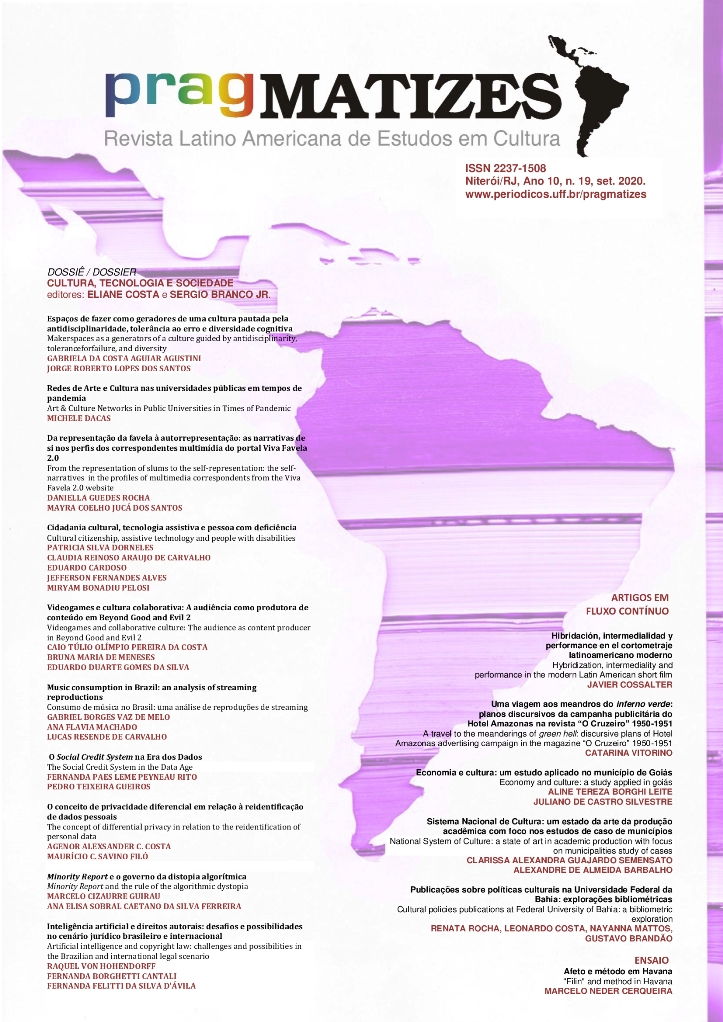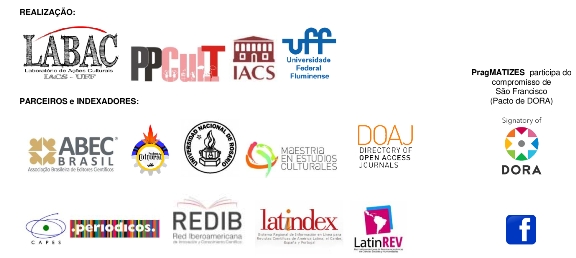Artificial intelligence and copyright law: challenges and possibilities in the Brazilian and international legal scenario
DOI:
https://doi.org/10.22409/pragmatizes.v10i19.41210Keywords:
Artificial intelligence. Intellectual works. CopyrightAbstract
It is undeniable that artificial intelligence software increasingly produces content that previously only affected humans. Since 1970, there have been artistic works created by artificial intelligences and even in a format that can be considered original and creative. This fact gave rise to the theoretical confrontation about the (in) possibility of such works being protected by copyright. There are at least three theories on the subject: the first assigns copyright directly to artificial intelligence, from the creation of an electronic personality, or by developing a co-authorship with artificial intelligence; the second assigns copyright to the software developer or the company behind the investment, and the third argues that there is no need to talk about copyright in this case, because the work would belong to the public domain. The discussion of the subject faces deep-rooted questions about the way human beings understand the world, of great complexity, related to philosophical, psychological, social and also legal problems. And it is for this reason that none of the theoretical currents presented are able to fully solve all the challenges imposed on Copyright Law, since the crux of the matter for solving the proposed issue is the understanding of human intelligence itself and its limitations. For the realization of the theoretical analysis, based on exploratory and bibliographic research, we started with concrete cases, using, therefore, the inductive method for preparing the work.
Downloads
References
ABRÃO, Eliane Y. Direitos de autor e direitos conexos. 2. ed. rev. e ampl. São Paulo: Migalhas, 2014.
ALPHAGO. In: Deep Mind. [S. l.,2019?]. Disponível em: https://deepmind.com/research/case-studies/alphago-the-story-so-far. Acesso: 11 out. 2019.
BRANCO, Sergio. O domínio público no direito autoral brasileiro. Rio de Janeiro: Lumen Juris, 2011.
BRASIL. [Constituição (1988)]. Constituição da República Federativa do Brasil de 1988. Brasília, DF: Presidência da República, 1988. Disponível em: http://www.planalto.gov.br/ccivil_03/constituicao/constituicao.htm. Acesso: 06 nov. 2019.
BRASIL. Lei nº 9.610, de 19 de fevereiro de 1998. Altera, atualiza e consolida a legislação sobre direitos autorais e dá outras providências. Brasília, DF: Presidência da República, 2019.Disponível em: http://www.planalto.gov.br/ccivil_03/leis/l9610.htm. Acesso: 10 jun. 2019.
CANTALI, Fernanda Borghetti. Inteligência artificial e direito de autor: tecnologia disruptiva exigindo reconfiguração de categorias jurídicas. Revista de Direito, Inovação, Propriedade Intelectual e Concorrência, Porto Alegre, v. 4, n. 2, p. 9, jul./dez. 2018. Disponível em: https://www.researchgate.net/publication/330972277_INTELIGENCIA_ARTIFICIAL_E_DIREITO_DE_AUTOR_TECNOLOGIA_DISRUPTIVA_EXIGINDO_RECONFIGURACAO_DE_CATEGORIAS_JURIDICAS. Acesso: 20 jun. 2019.
CARBONI, Guilherme. Direitos autorais e novas formas de autoria: processos interativos, meta-autoria e criação colaborativa. Revista de Mídia e Entretenimento do IASP, São Paulo, ano I, v. 1, jan./jun. 2015. Disponível em: https://www.academia.edu/20018505/Direitos_Autorais_e_Novas_Formas_de_Autoria_Processos_Interativos_Meta-Autoria_e_Cria%C3%A7%C3%A3o_Colaborativa. Acesso: 23 out. 2018.
COHEN, Paul. Harold Cohen and AARON. AI Magazine, [s. l.], p. 63-66, 2016. Disponível em: https://pdfs.semanticscholar.org/0835/f128bfd720dcb1b2ab507781ff9ab4855cba.pdf. Acesso: 01 maio 2019.
DADDY'S Car: a song composed by Artificial Intelligence - in the style of the Beatles. [S. l.: s. n.], 19 set. 2016. 1 vídeo (3 min). Publicado pelo canal Sony CSL. Disponível em: https://www.youtube.com/watch?v=LSHZ_b05W7o. Acesso: 06 nov. 2019.
DÍAZ-LIMÓN, Jaime Alberto. Daddy’s car: la inteligencia artificial como herramienta facilitadora de derechos de autor. Revista La Propriedad Inmaterial, Colombia, n. 22, p. 83-100, jul./dez. 2016. Disponível em: https://revistas.uexternado.edu.co/index.php/propin/article/view/4779/5569. Acesso: 20 jun. 2019.
FRAGOSO, João Henrique da Rocha. Direito autoral: da antiguidade à internet. São Paulo: Quartier Latin, 2009. p. 47.
GONÇALVES, Lukas Ruthes. A tutela jurídica de trabalhos criativos feitos por aplicações de inteligência artificial no Brasil. (Mestrado em Direito). Universidade Federal do Paraná. Curitiba, 2019. Disponível em: https://acervodigital.ufpr.br/bitstream/handle/1884/60345/R%20-%20D%20-%20LUKAS%20RUTHES%20GONCALVES.pdf?sequence=1&isAllowed=y. Acesso: 06 nov. 2019.
GRUBOW, Jared Vasconcellos. O.K. Computer: the devolution of human creativity and granting musical copyrights to artificially intelligent joint authors. Cardozo Law Review, Nova Iorque, v. 40, 2019. Disponível em: http://cardozolawreview.com/the-devolution-of-human-creativity-and-granting-musical-copyrights-to-ai-joint-authors/. Acesso: 20 jun. 2019.
GUADAMUZ, Andres. Do androids dream of electric copyright? Comparative analysis of originality in artificial intelligence generated works. Intellectual Property Quarterly, Londres, n. 2, jun. 2017. Disponível em: https://poseidon01.ssrn.com/delivery.php?ID=872119091124112017019102007127095087049073070064025021111113077102071093101116120000120032062006006027002112105106111069025005000029026049019125079082024090083011034006054125065096004065096121066076026002118074091096097111074111098082126122064117083&EXT=pdf. Acesso: 23 out. 2018.
HARARI, Yuval Noah. 21 lições para o século 21. São Paulo: Companhia das Letras, 2018.
KURSWEIL apud PISTONO, Federico. Os robôs vão roubar seu trabalho, mas tudo bem: como sobreviver ao colapso econômico e ser feliz. São Paulo: Portfolio-Penguin, 2017.
MANS, Matheus. Curta-metragem “Sunspring” é o primeiro do mundo a ser escrito por sistema de algoritmos. O Estado de São Paulo, São Paulo, 23 jun. 2016. Disponível em: https://cultura.estadao.com.br/noticias/cinema,curta-metragem-sunspring-e-o-primeiro-do-mundo-a-ser-escrito-por-sistema-de-algoritmos,10000058729. Acesso: 27 out. 2019.
PARLAMENTO EUROPEU. European civil law rules in robotics: study for the JURI comittee. Bruxelas, 2016. Disponível em: http://www.europarl.europa.eu/RegData/etudes/STUD/2016/571379/IPOL_STU(2016)571379_EN.pdf. Acesso: 10 jun. 2019.
REINO UNIDO. Copyright, Designs and Patent Act 1988. Londres: Parlamento do Reino Unido, 1988. Disponível em: http://www.legislation.gov.uk/ukpga/1988/48/contents. Acesso em: 06 nov. 2019.
RUSSEL, Stuart J.; NORVIG, Peter. Inteligência artificial. Rio de Janeiro: Elsevier, 2013. cap. 1. E-book (não paginado).
SCHAFER, Burkhard; KOMUVES, David; ZATARAIN, Jesus Manuel Niebla; DIVER, Laurence. A fourth law of robotics? Copyright and the law and ethics of machine co-production. Artificial Intelligence and Law, [s. l.], v. 23, n. 3, p. 217-240, set. 2015. Disponível em: https://link.springer.com/article/10.1007/s10506-015-9169-7. Acesso: 20 jun. 2019.
SCHWAB, Klaus. A quarta revolução industrial. São Paulo: Edipro, 2016.
SHIRRU, Lucas. Inteligência artificial e o direito autoral: o domínio público em perspectiva. Disponível em: https://itsrio.org/wp-content/uploads/2019/04/Luca-Schirru-rev2-1.pdf. Acesso: 16 set. 2019.
SUNSPRING | A Sci-Fi Short Film Starring Thomas Middleditch. [S. l.: s. n.], 09 jun. 2016. 1 vídeo (9 min 02 s). Publicado pelo canal Ars Technica. Disponível em: https://www.youtube.com/watch?v=LY7x2Ihqjmc. Acesso: 06 nov. 2019.
TECNOLOGIA. In: HOUAISS, Antônio. Minidicionário da língua portuguesa. 4. ed. rev. e aum. Rio de Janeiro: Objetiva, 2010.
TRIDENTE, Alessandra. Direito autoral: paradoxos e contribuições para a revisão da tecnologia jurídica no século XXI. 1. ed. Rio de Janeiro: Elsevier, 2009.
ZAFFARI, Felipe Pozueco; ESPÍNDOLA, Jean Carlo de Borba. Conceitos o que é inteligência artificial? In: BARONE, Dante Augusto Couto; BOESING, Ivan Jorge (org.). Inteligência artificial: diálogos entre mentes e máquinas. Porto Alegre: AGE/Evangraf, 2015.
Published
How to Cite
Issue
Section
License
By forwarding an original to PragMATIZES, the authors agree that the copyright related to it is transferred to the Publishing. Articles and other writings are made available in PDF format from their publication, and they can be downloaded to institutional repositories and personal pages, provided that with their proper bibliographic indication.



